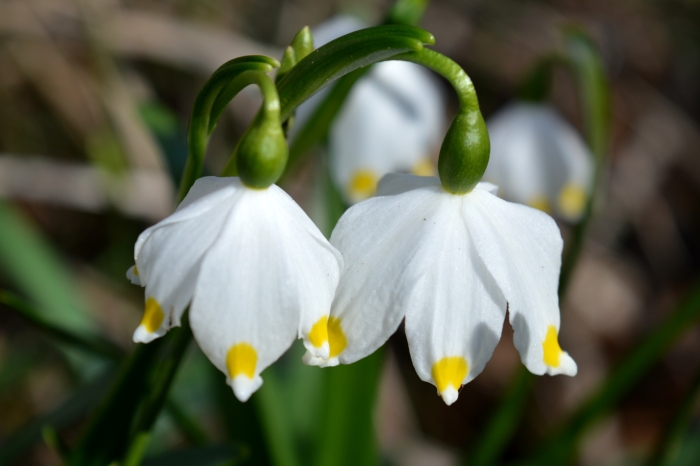Spring Snowflake
(Leucojum vernum)
Spring Snowflake (Leucojum vernum)
/
/

Ragnar1904
CC BY-SA 4.0
Image By:
Ragnar1904
Recorded By:
Copyright:
CC BY-SA 4.0
Copyright Notice:
Photo by: Ragnar1904 | License Type: CC BY-SA 4.0 | License URL: https://creativecommons.org/licenses/by-sa/4.0 | Uploader: Ragnar1904 | Publisher: Wikipedia Commons |










































































Estimated Native Range
Summary
Leucojum vernum, commonly known as Spring Snowflake, is a deciduous perennial herb native to damp, open woodlands and meadows in Central Europe, particularly in the regions from France to Ukraine. It typically grows 12–35 cm (4.7–13.8 in) tall when in flower, forming clumps through bulb offsets in favorable conditions. Each plant produces a single, nodding white flower with distinctive greenish marks near the tip of each tepal, borne on a stem about 10–20 cm (3.9–7.9 in) tall, though occasionally taller. The pendant, bell-shaped flowers are most often solitary but can sometimes appear in an umbel of two, emerging in early spring and providing a delicate display.
Spring Snowflake is valued for its early spring blooms, which can enliven a garden when few other plants are flowering. It is a popular choice for naturalizing in lawns, woodland gardens, and along stream banks. The species has been awarded the Royal Horticultural Society’s Award of Garden Merit, signifying its reliability and performance in gardens. It thrives in a range of light conditions, from full sun to partial shade, and prefers moist, well-drained soil. While it is easy to grow, it can be susceptible to bulb rot in overly wet conditions and may be affected by pests such as slugs. It is not known for aggressive roots or significant disease problems. Gardeners should be aware that all parts of the plant are toxic if ingested.CC BY-SA 4.0
Spring Snowflake is valued for its early spring blooms, which can enliven a garden when few other plants are flowering. It is a popular choice for naturalizing in lawns, woodland gardens, and along stream banks. The species has been awarded the Royal Horticultural Society’s Award of Garden Merit, signifying its reliability and performance in gardens. It thrives in a range of light conditions, from full sun to partial shade, and prefers moist, well-drained soil. While it is easy to grow, it can be susceptible to bulb rot in overly wet conditions and may be affected by pests such as slugs. It is not known for aggressive roots or significant disease problems. Gardeners should be aware that all parts of the plant are toxic if ingested.CC BY-SA 4.0
Plant Description
- Plant Type: Herb
- Height: 0.7-0.8 feet
- Width: 0.2-0.3 feet
- Growth Rate: Moderate
- Flower Color: White
- Flowering Season: Spring
- Leaf Retention: Deciduous
Growth Requirements
- Sun: Full Sun, Part Shade
- Water: Medium
- Drainage: Slow, Medium, Fast
Common Uses
Bee Garden, Border Plant, Deer Resistant, Fragrant, Low Maintenance, Potted Plant, Rabbit Resistant, Rock Garden, Showy Flowers
Natural Habitat
Damp, open woodlands and meadows in Central Europe, from France to Ukraine
Other Names
Common Names: Vår-Hvidblomme, Frühlings-Knotenblume, Märzenbecher, Nivéole Printanière, Lenteklokje, Snöklocka
Scientific Names: , Leucojum vernum, Leucojum vernum subsp. vernum, Erinosma verna, Leucojum vernum subsp. carpaticum, Achyranthes carpathicum, Galanthus vernus, Leucojum vernum subsp. carpathicum, Leucojum vernum var. biflorum, Nivaria verna,
GBIF Accepted Name: Leucojum vernum L.